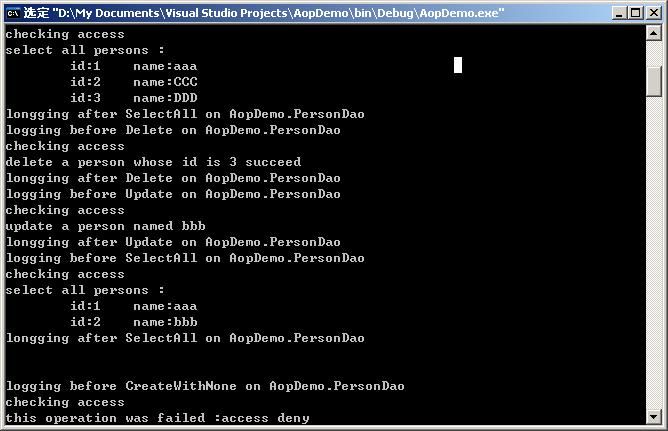- 深入理解AOP(面向切面编程)及其应用
自身就是太阳
java开发语言spring
目录AOP的核心概念AOP的实现方式1.定义DAO接口和实现类2.定义通知类3.开启AOP注解驱动切入点表达式通配符的使用:AOP通知类型案例分析:测量业务层接口的执行效率结论概述:AOP(Aspect-OrientedProgramming,面向切面编程)是一种编程范式,主要用于将共性功能从具体的业务逻辑中分离出来,实现松耦合的代码设计。其作用是在不修改原始代码的情况下,对现有方法进行增强,广泛
- SpringBoot—集成AOP详解(面向切面编程Aspect)
Hughman
AOP介绍AOP概述 AOP是Aspect-OrientedProgramming,即为面向(切面)方面编程。在维基百科中的解释:Aspect是一种新的模块化机制,用来描述分散在对象、类或函数中的横切关注点。从关注点中分离出横切关注点是面向切面的程序设计核心概念。分离关注点使得解决特定领域问题的代码从业务逻辑中独立出来,业务逻辑代码不需要再包含针对特定领域问题代码的调用,比如一些公用模块的日志、
- 搭建第一个SpringDataJPA工程
码来码去(未来可期)
JavaWebjava
第一步:创建maven工程,导入maven坐标使用SpringDataJPA,需要整合Spring与SpringDataJPA,并且需要提供JPA的服务提供者hibernate,所以需要导入spring相关坐标,hibernate坐标,数据库驱动坐标等4.2.4.RELEASE5.0.7.Final1.6.61.2.120.9.1.25.1.6junitjunit4.9testorg.aspect
- JavaWeb笔记整理14——公共字段自动填充技术实现
mikey棒棒棒
笔记反射SpringAOP公共字段自动填充JavaWeb面向切面编程Aspect
目录为什么需要公共字段自动填充?步骤1自定义注解AutoFill步骤2自定义切面AutoFillAspect步骤3在Mapper接口的方法上加入AutoFill注解@Before("autoFillPointCut()")JoinPoint你能通过JoinPoint获取哪些信息?例子中的JoinPoint获取方法签名和注解获取被拦截方法的参数反射什么是反射获取Class对象获取Method对象动态
- 深入浅出:使用Spring Boot实现AOP切面编程
一休哥助手
javaspringboot后端java
目录引言AOP概述AOP的定义与核心概念AOP的优势SpringBoot中的AOP实现SpringAOP与AspectJ依赖配置AOP的工作原理
- 19.3-装饰器习题cache和命令分发器实现
BeautifulSoulpy
当你处于低潮期的时候,好好想想,就算现在攒不到钱,攒点知识,交情,经验,最不济攒点教训也行!装饰器一定要多加练习,装饰器是越练越熟练;后面很多框架一装饰就能用了,经常见到的各种类型的装饰器都要练一遍;本章总结:无参、有参、缓存装饰器、通用装饰器、1.40;装饰器是AOP面向对象编程AspectOrientedProgramming思想的体现;想装饰器return是什么很重要,装饰器装饰器(Deco
- Spring—AOP
hitmengfanchao
云计算与软件服务#Spring框架springjava后端云计算
目录1.AOP中的基本概念2.Spring中建立AOP应用的步骤2.1.添加依赖2.2.启用AspectJ注解支持2.3.定义切面2.4.定义切点2.5.定义通知方法2.6.编写业务类2.7.运行应用并测试3.@within注解4.AOP的优点面向方面编程(Aspect-OrientedProgramming,简称AOP)是一种编程范式,旨在通过分离横切关注点(cross-cuttingconce
- Spring核心功能——AOP(面向切面编程)
200不是二百
Springspringjava数据库
目录AOP1介绍2AOP术语3应用场景4演示AOP1介绍Spring中另外一个核心功能,AOPAOP(AspectOrientedProgramming),即面向切面编程.OOP(ObjectOrientedProgramming),即面向对象编程.AOP面向切面编程,利用一种称为"横切"的技术,剖开封装的对象内部,并将那些影响了多个类的公共行为抽取出封装到一个可重用模块),并将其命名为"Aspe
- AOP面向切面编程
科马
javaspringjava后端
AOP面向切面编程如何理解面向切面编程举例理解:核心概念:SpringAOP两种配置风格基于注解的`@AspectJ`风格基于XML的Schema风格代理机制JDK动态代理CGLIB代理编程方式创建代理配置AspectJ加载时织入如何理解面向切面编程面向切面编程(Aspect-OrientedProgramming,简称AOP)是一种编程范式,它允许开发者将横切关注点(如日志记录、事务管理等)与业
- AOP(面向切面编程)
买完可乐
spring
1.AOP是什么AOP是面向切面编程,能够让我们在不影响原有功能的前提下,为软件横向扩展功能2.搭建SpringAOP使用aspect实现aop的基本步骤:1.新建maven项目2.加入依赖(1)spring依赖(2)aspectj依赖(3)junit单元测试3.创建目标类:接口和他的实现类。要做的是给类中的方法增加功能4.创建切面类:普通类(1)在类的上面加入@Aspect(2)在类中定义方法,
- Spring高手之路22——AOP切面类的封装与解析
砖业洋__
Spring高手之路JavaspringaopAdvisorTargetSource
文章目录1.AOP是如何收集切面类并封装的?2.Advisor是什么,它是怎么构建的?2.1什么是Advisor2.2Advisor的构建(源码分析+时序图说明)3.TargetSource的构建和作用3.1TargetSource的作用3.2TargetSource的构建1.AOP是如何收集切面类并封装的?在Spring中,AOP(Aspect-OrientedProgramming,面向切面编
- Spring AOP中的动态代理:JDK动态代理和CGLIB动态代理
裘马轻狂大帅
静态代理模式 所谓静态代理就是AOP框架会在编译阶段生成AOP代理类,因此也称为编译时增强。ApsectJ是静态代理的实现之一,也是最为流行的。静态代理由于在编译时就生成了代理类,效率相比动态代理要高一些。AspectJ可以单独使用,也可以和Spring结合使用。动态代理模式 与静态代理不同,动态代理就是说AOP框架不会去修改编译时生成的字节码,而是在运行时在内存中生成一个AOP代理对象,这个AO
- day07 Spring 事务与集成 MyBatis
灰灰.X
mybatisspringjava
理解AOP是什么,为什么使用AOP,Spring与它是什么关系。AOP是一种面向切面(where,when,what)编程思想想给某些类的某些方法加功能,不用去修改其代码,只要编写配置即可,底层最终使用动态代理帮我们加功能和方法,以后在写多个方法的时候,出现相同的代码的时候,考虑使用AOP来解决spring是AOP思想之一,实际使用的时候需要添加spring-aop和aspectjweaver两个
- Spring Boot 中 AOP 的实用举例
bencolyy
javaspringboot开发语言
SpringBoot中AOP的实用举例在软件开发中,面向切面编程(AOP)是一种强大的技术,它可以帮助我们将横切关注点(如日志记录、事务管理、安全检查等)从业务逻辑中分离出来,提高代码的可维护性和可扩展性。SpringBoot对AOP提供了很好的支持,本文将通过具体的例子来讲解SpringBoot中AOP的使用。一、什么是AOPAOP即AspectOrientedProgramming,面向切面编
- 【spring】Spring的aop
闲着无聊整些资料
Springspringjava后端
之前的文章中我们介绍了Spring的控制反转和依赖注入,今天来详细说说Spring的aop。aop(AspectOrientedProgramming)即面向切面编程,它是Spring提出的一种思想,是为了在不修改源代码的基础上对原代码进行增强,Springaop是aop思想的实现。我们知道java一贯接收的是OOP(ObjectOrientedProgramming,面向对象开发)思想,在开发过
- Spring——AOP面向切面编程&SpringAOP与AspectJ比较
七海健人
Spring框架springjava
最近跟着源码研究了下Spring使用三级缓存处理循环依赖的原理,里面涉及到SpringAOP的概念;本篇介绍AOP相关的知识点,AOP下的概念名词比较多,尽量使用通俗的概念来逐个解释,内容包括:对AOP(面向切面编程)的理解、AOP下的名词概念、SpringAOP与AspectJ的比较等;这部分知识对于学习Spring框架或者面试,都非常重要,需要掌握;1.到底什么是AOP(面向切面编程)?乍一看
- Java 中的 AOP(面向切面编程)与 IoC(控制反转)解析
小于负无穷
java开发语言springspringbootspringcloud
Java开发中,AOP(Aspect-OrientedProgramming,面向切面编程)和IoC(InversionofControl,控制反转)是两个非常重要的概念,特别是在使用Spring框架时。一、什么是IoC?1.1控制反转的定义控制反转(IoC)是一种设计原则,用于将对象的创建和依赖的管理职责从代码中抽离出来,交由框架或容器来负责。传统的面向对象编程中,对象通常自己负责依赖的创建和管
- redis能正常访问,但是springboot编译报错
思想永无止境
JavaEEredisspringboot数据库
redis能正常访问,配置也确定无误,但是springboot编译报错:Failedtobindpropertiesunder‘spring.redis.host’tojava.lang.String原因:我新加了一个类导致:@ConfigurationpublicclassMyConf{@BeanpublicLogAspectlogAspect(){returnnewLogAspect();}}
- springboot整合aop实现日志记录
walkerShen
知识概况定义:在软件业,AOP为AspectOrientedProgramming的缩写,意为:面向切面编程,通过预编译方式和运行期间动态代理实现程序功能的统一维护的一种技术。AOP是OOP的延续,是软件开发中的一个热点,也是Spring框架中的一个重要内容,是函数式编程的一种衍生范型。利用AOP可以对业务逻辑的各个部分进行隔离,从而使得业务逻辑各部分之间的耦合度降低,提高程序的可重用性,同时提高
- Spring-2- AOP 切面编程
花下的晚风
java后端转后厨springjava后端
当我们需要对一个类中的方法进行功能的增强,又不想改变原方法的代码时当我们需要保护一个类中的代码时我们都可以使用代理模式,帮助这个类完成一些功能,这就是AOP切面编程核心:切面=通知+切点首先,需要引入AOP要用到的依赖4.0.0com.breezeaspect1.0-SNAPSHOTjarrepository.spring.milestoneSpringMilestoneRepositoryhtt
- spring-aop-xml全自动
山间清泉1111
切面类packagecom.mu.aop_xml.jdk_proxy.service.impl;importorg.aopalliance.intercept.MethodInterceptor;importorg.aopalliance.intercept.MethodInvocation;/***半自动/全自动切面类*/publicclassMyAspect1implementsMethodI
- Maven项目中Allure和AspectJ的配置及测试执行(常见报错解决方法)
杰哥的编程世界
java接口自动化测试mavenjava
Maven项目中Allure和AspectJ的配置及测试执行在自动化测试领域,Allure和AspectJ是两个非常有用的工具。Allure提供了丰富的测试报告,而AspectJ则允许我们以声明式的方式编写横切关注点,如日志记录、事务管理等。本文将指导您如何在Maven项目中配置这两个工具,并使用MavenSurefire插件来执行测试用例。1.添加依赖首先,我们需要在pom.xml文件中添加Al
- 【速览】Spring(更新中)
GIS程序媛—椰子
springjava后端
目录一、背景二、优缺点三、适用场景四、核心组成1.IoC(InversionofControl,控制反转)2.DI(DependencyInjection,依赖注入)3.AOP(Aspect-OrientedProgramming,面向切面编程)4.MVC(Model-View-Controller,模型-视图-控制器)五、底层原理六、对比参考一、背景这个技术出现的背景、初衷和要达到什么样的目标或
- DOM EventListener: A Comprehensive Guide
wjs2024
开发语言
DOMEventListener:AComprehensiveGuideIntroductionTheDocumentObjectModel(DOM)isacrucialaspectofwebdevelopment,allowingdeveloperstomanipulateandinteractwithwebpagesdynamically.OneofthekeyfeaturesoftheDOM
- Spring笔记(一)
m0_75227909
spring笔记java
一、了解Spring1.Spring概述Spring是分层的JavaSE/EE应用full-stack轻量级开源框架,以IOC(InverseOfControl:反转控制)和AOP(AspectOrientedProgramming:面向切面编程)为内核,提供了展现层SpringMVC和持久层SpringJDBC以及业务层事务管理等众多的企业级应用技术,还能整合开源世界众多著名的第三方框架和类库,
- ruoyi的spring cloud项目详解(二)
阿贾克斯的黎明
javaspringcloudjavaspring
ruoyi的springcloud项目详解(一)-CSDN博客上一篇内容我们讲述了springcloud的权限认证,如何用一个注解和AOP代码带整合一个注解,将来用这个注解整合到方法上,进行权限认证,回忆一下PreAuthorizeAspect`这个类整体被称为切面。@Around("@annotation(com.ruoyi.common.auth.annotation.HasPermissio
- Spring&SpringBoot
众愿
springspringbootjava
1.Spring框架Spring是一款开源的轻量级Java开发框架,旨在提高开发人员的开发效率以及系统的可维护性。我们一般说Spring框架指的都是SpringFramework,它是很多模块的集合,使用这些模块可以很方便地协助我们进行开发,比如说Spring支持IoC(InversionofControl:控制反转)和AOP(Aspect-OrientedProgramming:面向切面编程)、
- 使用多线程的方式模拟高并发请求接口,用于自测接口的稳定性【项目】
还算善良_
私有代码库工具类javalist数据结构
packagecom.gitee.taven.test;importcom.gitee.taven.ApiResult;importcom.gitee.taven.aop.RepeatSubmitAspect;importorg.slf4j.Logger;importorg.slf4j.LoggerFactory;importorg.springframework.beans.factory.an
- Aspect Ratio 常见的画面纵横比及其像素分辨率
流浪字节π
计算机视觉人工智能视频编解码图像处理
前言所谓AspectRatio,描述的是画面出现在屏幕上的样子,是屏幕或图像的宽度和高度之间的比率,国际标准为1.33:1,遮幅宽银幕影片为1.85:1。本文列出了一些常见的画面纵横比及其像素分辨率。1080p纵横比分辨率0.80(4:5)864x10801.25(5:4)1350x10801.33(4:3)1440x10801.66(5:3)1800x10801.78(16:9)1920x108
- Spring常见知识总结
yusheng_xyb
springjava后端
什么是Spring?Spring是一款开源的轻量级Java开发框架,旨在提高开发人员的开发效率以及系统的可维护性。我们一般说Spring框架指的都是SpringFramework,它是很多模块的集合,使用这些模块可以很方便地协助我们进行开发,比如说Spring支持IoC(InversionofControl:控制反转)和AOP(Aspect-OrientedProgramming:面向切面编程)、
- 分享100个最新免费的高匿HTTP代理IP
mcj8089
代理IP代理服务器匿名代理免费代理IP最新代理IP
推荐两个代理IP网站:
1. 全网代理IP:http://proxy.goubanjia.com/
2. 敲代码免费IP:http://ip.qiaodm.com/
120.198.243.130:80,中国/广东省
58.251.78.71:8088,中国/广东省
183.207.228.22:83,中国/
- mysql高级特性之数据分区
annan211
java数据结构mongodb分区mysql
mysql高级特性
1 以存储引擎的角度分析,分区表和物理表没有区别。是按照一定的规则将数据分别存储的逻辑设计。器底层是由多个物理字表组成。
2 分区的原理
分区表由多个相关的底层表实现,这些底层表也是由句柄对象表示,所以我们可以直接访问各个分区。存储引擎管理分区的各个底层
表和管理普通表一样(所有底层表都必须使用相同的存储引擎),分区表的索引只是
- JS采用正则表达式简单获取URL地址栏参数
chiangfai
js地址栏参数获取
GetUrlParam:function GetUrlParam(param){
var reg = new RegExp("(^|&)"+ param +"=([^&]*)(&|$)");
var r = window.location.search.substr(1).match(reg);
if(r!=null
- 怎样将数据表拷贝到powerdesigner (本地数据库表)
Array_06
powerDesigner
==================================================
1、打开PowerDesigner12,在菜单中按照如下方式进行操作
file->Reverse Engineer->DataBase
点击后,弹出 New Physical Data Model 的对话框
2、在General选项卡中
Model name:模板名字,自
- logbackのhelloworld
飞翔的马甲
日志logback
一、概述
1.日志是啥?
当我是个逗比的时候我是这么理解的:log.debug()代替了system.out.print();
当我项目工作时,以为是一堆得.log文件。
这两天项目发布新版本,比较轻松,决定好好地研究下日志以及logback。
传送门1:日志的作用与方法:
http://www.infoq.com/cn/articles/why-and-how-log
上面的作
- 新浪微博爬虫模拟登陆
随意而生
新浪微博
转载自:http://hi.baidu.com/erliang20088/item/251db4b040b8ce58ba0e1235
近来由于毕设需要,重新修改了新浪微博爬虫废了不少劲,希望下边的总结能够帮助后来的同学们。
现行版的模拟登陆与以前相比,最大的改动在于cookie获取时候的模拟url的请求
- synchronized
香水浓
javathread
Java语言的关键字,可用来给对象和方法或者代码块加锁,当它锁定一个方法或者一个代码块的时候,同一时刻最多只有一个线程执行这段代码。当两个并发线程访问同一个对象object中的这个加锁同步代码块时,一个时间内只能有一个线程得到执行。另一个线程必须等待当前线程执行完这个代码块以后才能执行该代码块。然而,当一个线程访问object的一个加锁代码块时,另一个线程仍然
- maven 简单实用教程
AdyZhang
maven
1. Maven介绍 1.1. 简介 java编写的用于构建系统的自动化工具。目前版本是2.0.9,注意maven2和maven1有很大区别,阅读第三方文档时需要区分版本。 1.2. Maven资源 见官方网站;The 5 minute test,官方简易入门文档;Getting Started Tutorial,官方入门文档;Build Coo
- Android 通过 intent传值获得null
aijuans
android
我在通过intent 获得传递兑现过的时候报错,空指针,我是getMap方法进行传值,代码如下 1 2 3 4 5 6 7 8 9
public
void
getMap(View view){
Intent i =
- apache 做代理 报如下错误:The proxy server received an invalid response from an upstream
baalwolf
response
网站配置是apache+tomcat,tomcat没有报错,apache报错是:
The proxy server received an invalid response from an upstream server. The proxy server could not handle the request GET /. Reason: Error reading fr
- Tomcat6 内存和线程配置
BigBird2012
tomcat6
1、修改启动时内存参数、并指定JVM时区 (在windows server 2008 下时间少了8个小时)
在Tomcat上运行j2ee项目代码时,经常会出现内存溢出的情况,解决办法是在系统参数中增加系统参数:
window下, 在catalina.bat最前面
set JAVA_OPTS=-XX:PermSize=64M -XX:MaxPermSize=128m -Xms5
- Karam与TDD
bijian1013
KaramTDD
一.TDD
测试驱动开发(Test-Driven Development,TDD)是一种敏捷(AGILE)开发方法论,它把开发流程倒转了过来,在进行代码实现之前,首先保证编写测试用例,从而用测试来驱动开发(而不是把测试作为一项验证工具来使用)。
TDD的原则很简单:
a.只有当某个
- [Zookeeper学习笔记之七]Zookeeper源代码分析之Zookeeper.States
bit1129
zookeeper
public enum States {
CONNECTING, //Zookeeper服务器不可用,客户端处于尝试链接状态
ASSOCIATING, //???
CONNECTED, //链接建立,可以与Zookeeper服务器正常通信
CONNECTEDREADONLY, //处于只读状态的链接状态,只读模式可以在
- 【Scala十四】Scala核心八:闭包
bit1129
scala
Free variable A free variable of an expression is a variable that’s used inside the expression but not defined inside the expression. For instance, in the function literal expression (x: Int) => (x
- android发送json并解析返回json
ronin47
android
package com.http.test;
import org.apache.http.HttpResponse;
import org.apache.http.HttpStatus;
import org.apache.http.client.HttpClient;
import org.apache.http.client.methods.HttpGet;
import
- 一份IT实习生的总结
brotherlamp
PHPphp资料php教程php培训php视频
今天突然发现在不知不觉中自己已经实习了 3 个月了,现在可能不算是真正意义上的实习吧,因为现在自己才大三,在这边撸代码的同时还要考虑到学校的功课跟期末考试。让我震惊的是,我完全想不到在这 3 个月里我到底学到了什么,这是一件多么悲催的事情啊。同时我对我应该 get 到什么新技能也很迷茫。所以今晚还是总结下把,让自己在接下来的实习生活有更加明确的方向。最后感谢工作室给我们几个人这个机会让我们提前出来
- 据说是2012年10月人人网校招的一道笔试题-给出一个重物重量为X,另外提供的小砝码重量分别为1,3,9。。。3^N。 将重物放到天平左侧,问在两边如何添加砝码
bylijinnan
java
public class ScalesBalance {
/**
* 题目:
* 给出一个重物重量为X,另外提供的小砝码重量分别为1,3,9。。。3^N。 (假设N无限大,但一种重量的砝码只有一个)
* 将重物放到天平左侧,问在两边如何添加砝码使两边平衡
*
* 分析:
* 三进制
* 我们约定括号表示里面的数是三进制,例如 47=(1202
- dom4j最常用最简单的方法
chiangfai
dom4j
要使用dom4j读写XML文档,需要先下载dom4j包,dom4j官方网站在 http://www.dom4j.org/目前最新dom4j包下载地址:http://nchc.dl.sourceforge.net/sourceforge/dom4j/dom4j-1.6.1.zip
解开后有两个包,仅操作XML文档的话把dom4j-1.6.1.jar加入工程就可以了,如果需要使用XPath的话还需要
- 简单HBase笔记
chenchao051
hbase
一、Client-side write buffer 客户端缓存请求 描述:可以缓存客户端的请求,以此来减少RPC的次数,但是缓存只是被存在一个ArrayList中,所以多线程访问时不安全的。 可以使用getWriteBuffer()方法来取得客户端缓存中的数据。 默认关闭。 二、Scan的Caching 描述: next( )方法请求一行就要使用一次RPC,即使
- mysqldump导出时出现when doing LOCK TABLES
daizj
mysqlmysqdump导数据
执行 mysqldump -uxxx -pxxx -hxxx -Pxxxx database tablename > tablename.sql
导出表时,会报
mysqldump: Got error: 1044: Access denied for user 'xxx'@'xxx' to database 'xxx' when doing LOCK TABLES
解决
- CSS渲染原理
dcj3sjt126com
Web
从事Web前端开发的人都与CSS打交道很多,有的人也许不知道css是怎么去工作的,写出来的css浏览器是怎么样去解析的呢?当这个成为我们提高css水平的一个瓶颈时,是否应该多了解一下呢?
一、浏览器的发展与CSS
- 《阿甘正传》台词
dcj3sjt126com
Part Ⅰ:
《阿甘正传》Forrest Gump经典中英文对白
Forrest: Hello! My names Forrest. Forrest Gump. You wanna Chocolate? I could eat about a million and a half othese. My momma always said life was like a box ochocol
- Java处理JSON
dyy_gusi
json
Json在数据传输中很好用,原因是JSON 比 XML 更小、更快,更易解析。
在Java程序中,如何使用处理JSON,现在有很多工具可以处理,比较流行常用的是google的gson和alibaba的fastjson,具体使用如下:
1、读取json然后处理
class ReadJSON
{
public static void main(String[] args)
- win7下nginx和php的配置
geeksun
nginx
1. 安装包准备
nginx : 从nginx.org下载nginx-1.8.0.zip
php: 从php.net下载php-5.6.10-Win32-VC11-x64.zip, php是免安装文件。
RunHiddenConsole: 用于隐藏命令行窗口
2. 配置
# java用8080端口做应用服务器,nginx反向代理到这个端口即可
p
- 基于2.8版本redis配置文件中文解释
hongtoushizi
redis
转载自: http://wangwei007.blog.51cto.com/68019/1548167
在Redis中直接启动redis-server服务时, 采用的是默认的配置文件。采用redis-server xxx.conf 这样的方式可以按照指定的配置文件来运行Redis服务。下面是Redis2.8.9的配置文
- 第五章 常用Lua开发库3-模板渲染
jinnianshilongnian
nginxlua
动态web网页开发是Web开发中一个常见的场景,比如像京东商品详情页,其页面逻辑是非常复杂的,需要使用模板技术来实现。而Lua中也有许多模板引擎,如目前我在使用的lua-resty-template,可以渲染很复杂的页面,借助LuaJIT其性能也是可以接受的。
如果学习过JavaEE中的servlet和JSP的话,应该知道JSP模板最终会被翻译成Servlet来执行;而lua-r
- JZSearch大数据搜索引擎
颠覆者
JavaScript
系统简介:
大数据的特点有四个层面:第一,数据体量巨大。从TB级别,跃升到PB级别;第二,数据类型繁多。网络日志、视频、图片、地理位置信息等等。第三,价值密度低。以视频为例,连续不间断监控过程中,可能有用的数据仅仅有一两秒。第四,处理速度快。最后这一点也是和传统的数据挖掘技术有着本质的不同。业界将其归纳为4个“V”——Volume,Variety,Value,Velocity。大数据搜索引
- 10招让你成为杰出的Java程序员
pda158
java编程框架
如果你是一个热衷于技术的
Java 程序员, 那么下面的 10 个要点可以让你在众多 Java 开发人员中脱颖而出。
1. 拥有扎实的基础和深刻理解 OO 原则 对于 Java 程序员,深刻理解 Object Oriented Programming(面向对象编程)这一概念是必须的。没有 OOPS 的坚实基础,就领会不了像 Java 这些面向对象编程语言
- tomcat之oracle连接池配置
小网客
oracle
tomcat版本7.0
配置oracle连接池方式:
修改tomcat的server.xml配置文件:
<GlobalNamingResources>
<Resource name="utermdatasource" auth="Container"
type="javax.sql.DataSou
- Oracle 分页算法汇总
vipbooks
oraclesql算法.net
这是我找到的一些关于Oracle分页的算法,大家那里还有没有其他好的算法没?我们大家一起分享一下!
-- Oracle 分页算法一
select * from (
select page.*,rownum rn from (select * from help) page
-- 20 = (currentPag
![]()
